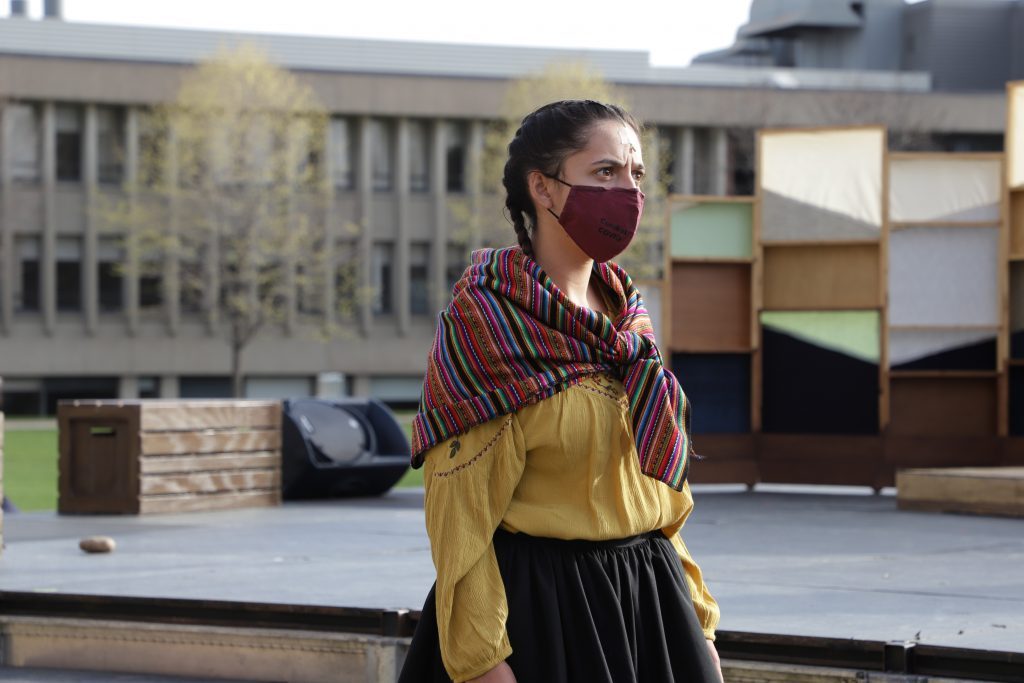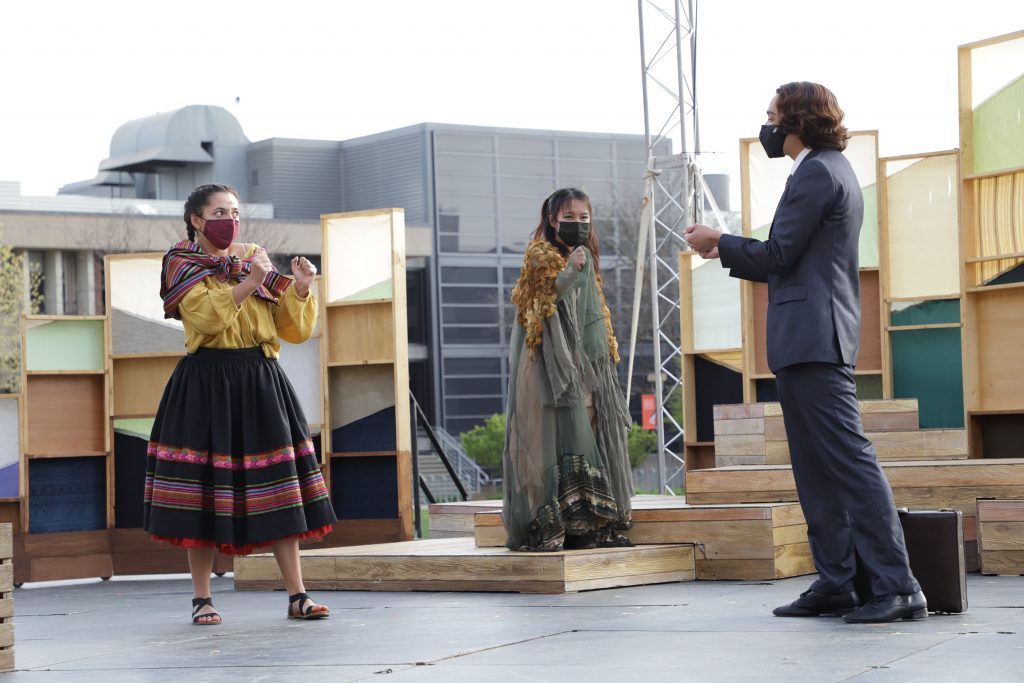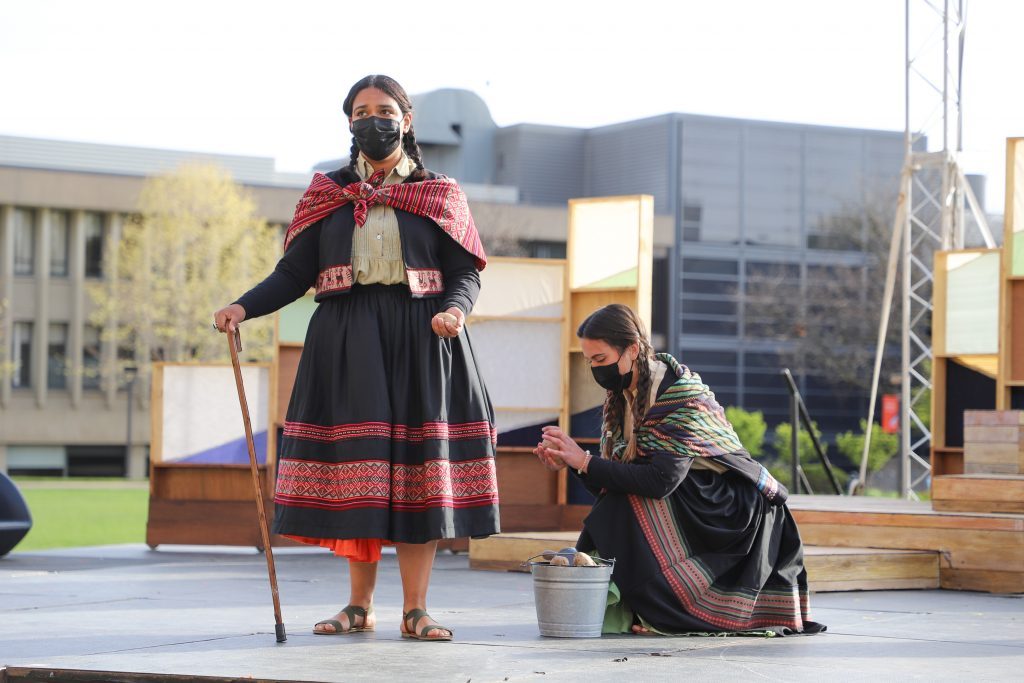Semester in Peru inspires a different kind of musical
August 9th, 2021 | Alumni, SIT Study Abroad

There are plenty of musicals that reference serious social justice issues. Evita confronts authoritarianism, Kinky Boots examines gender identity, and The Sound of Music broaches the Nazi occupation of Austria. But instead of coming away with indignation, audiences are more likely to be humming the show-stopping musical numbers that often sugarcoat the underlying themes.
With Como la Tierra (“Like the Earth”), SIT Peru alumna Gretta Marston-Lari has written a different kind of musical—one that defies expectations of how the genre normally looks and sounds. The play was shaped by her experience on SIT Study Abroad’s Peru program, Indigenous Peoples and Globalization. Gretta tackles hard truths— sexual assault, death, domestic violence, police and military violence, and exploitation of women—through a story that intertwines women’s resilience with the earth.
The play is based on events that were happening during Gretta’s 2019 semester abroad in Peru, where local communities opposed the Tia Maria mining company’s $1.4 billion copper mining project, fearing it would pollute the environment and do little for the local economy.
In the play, Juana Puyka, a campesina from Arequipa, is organizing her community to defend their valley from the mining company that wants to exploit and pollute it when Salvador, a criollo man from the city, embarks on a mission to make Juana his.
Originally written in Spanish, the musical was staged in English last spring at Macalester College, where Gretta has just graduated with a double major in theater and dance and Latin American studies. In 2020, as a Lin Manuel Miranda Family Fellow, Gretta participated in a playwright’s intensive at the National Theatre Institute’s Summer Program, and a New York City theater company has now picked up the script with plans to stage the musical next summer.
Although she has participated in many theater productions, staging her own original musical was both “phenomenal” and challenging, Gretta says. “Collaborating with and inviting so many other people into this world—that I didn’t create, but channeled—was interesting. I wanted to make sure everybody understood what we were representing on stage and that’s difficult because not everybody went to SIT.”

As it turned out, current events helped cast, crew, and audiences relate to the story as the production dovetailed with racial justice and environmental issues close to home.
“There was a conflict close to us in Minnesota with a pipeline being constructed on Indigenous people’s land,” Gretta says. “My friends were being arrested while we were performing. We were able to show on stage something so similar—something parallel that was happening on Ojibwe land. There were people at Macalester who didn’t know what was going on with the pipeline who suddenly wanted to.
“Also, the protests around police brutality in the Twin Cities felt connected to the scenes that showed the Peruvian military abusing their power. Black and brown bodies felt so disposable in those weeks leading up to the show. We embodied that in the work we were presenting.”
Gretta’s choice of study abroad programs is rooted in her heritage. She was born in New Mexico of Peruvian parents who moved the family back to Peru when Gretta was an infant. They lived there until she was 14, when they returned to the United States, but Gretta continued to search for a deeper understanding of her Indigenous ancestry.
“I felt a need to incorporate that part of myself into my academic formation,” she says. “SIT seemed like the right program to do that.”
Back in Peru with SIT, Gretta says, “I felt that I was finally learning what I had been longing to learn in all of my college courses. I was a Latin American Studies major and in my classes all I wanted to learn about was Peru, and in theater I felt distanced and absent from discussions because they felt very disconnected from what I cared about. The study abroad experience fed my soul in a way that was really needed and that I had been waiting for since I left Peru at age 14.”

On her program, Gretta says what she learned about agrarian reform and indentured slavery fueled her commitment to advance indigenous people’s movements for justice. “The conflict with a mining company…was happening when we were there. When I went to do my [Independent Study Project] I actually couldn’t even get past where I needed to go because there was a military presence, and it was too violent. That’s how alive the conflict was when I was studying it.”
Blocked from conducting her own interviews with women involved in the struggle, Gretta studied the research of local university students who had done extensive interviews with the women. As a theater and dance major, she says it felt natural to channel those voices into a musical production.
“We had been learning a lot about how Indigenous bodies of knowledge exist in an oral tradition. To me, theater in a large way is an exchange of knowledge, and it’s oral. I thought this was the best way I could connect to what was happening and to contribute to furthering their struggle.
“I knew Tia Maria would be over sooner or later, but it’s a struggle that keeps repeating and a cycle that Peruvians keep returning to. So, I wanted to cement and record it in a way that it could be referenced later to avoid the loss of historical memory that seems to happen in Peru.”
In drafting her play, which first took shape as her SIT Independent Study Project, Gretta originally intended for it to be performed in Spanish in Peru—which is still her goal.
While she works on finalizing her script for the New York production, Gretta is simultaneously revising the Spanish version with the dream of returning to Arequipa to present her play among the communities that inspired it.
